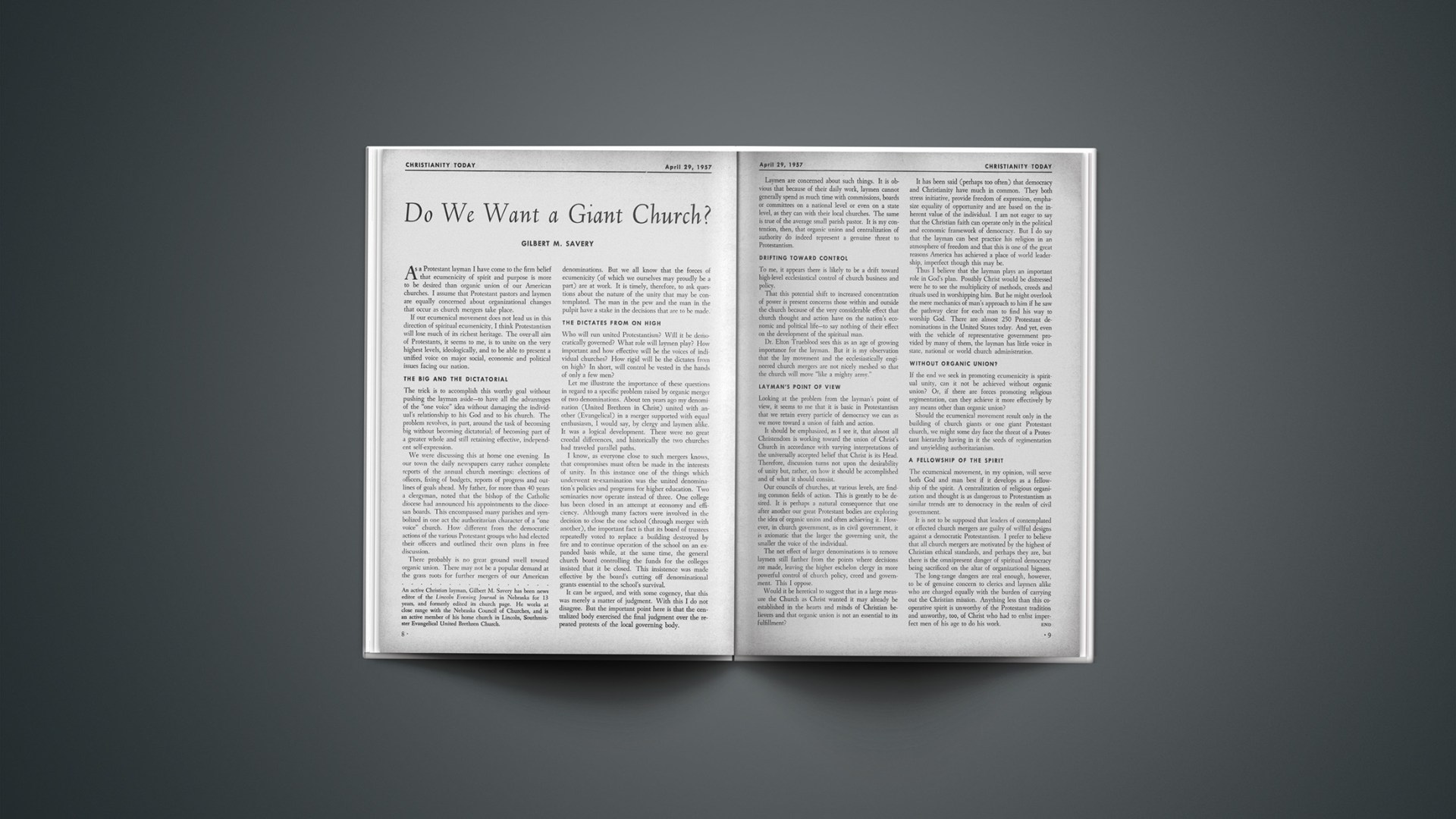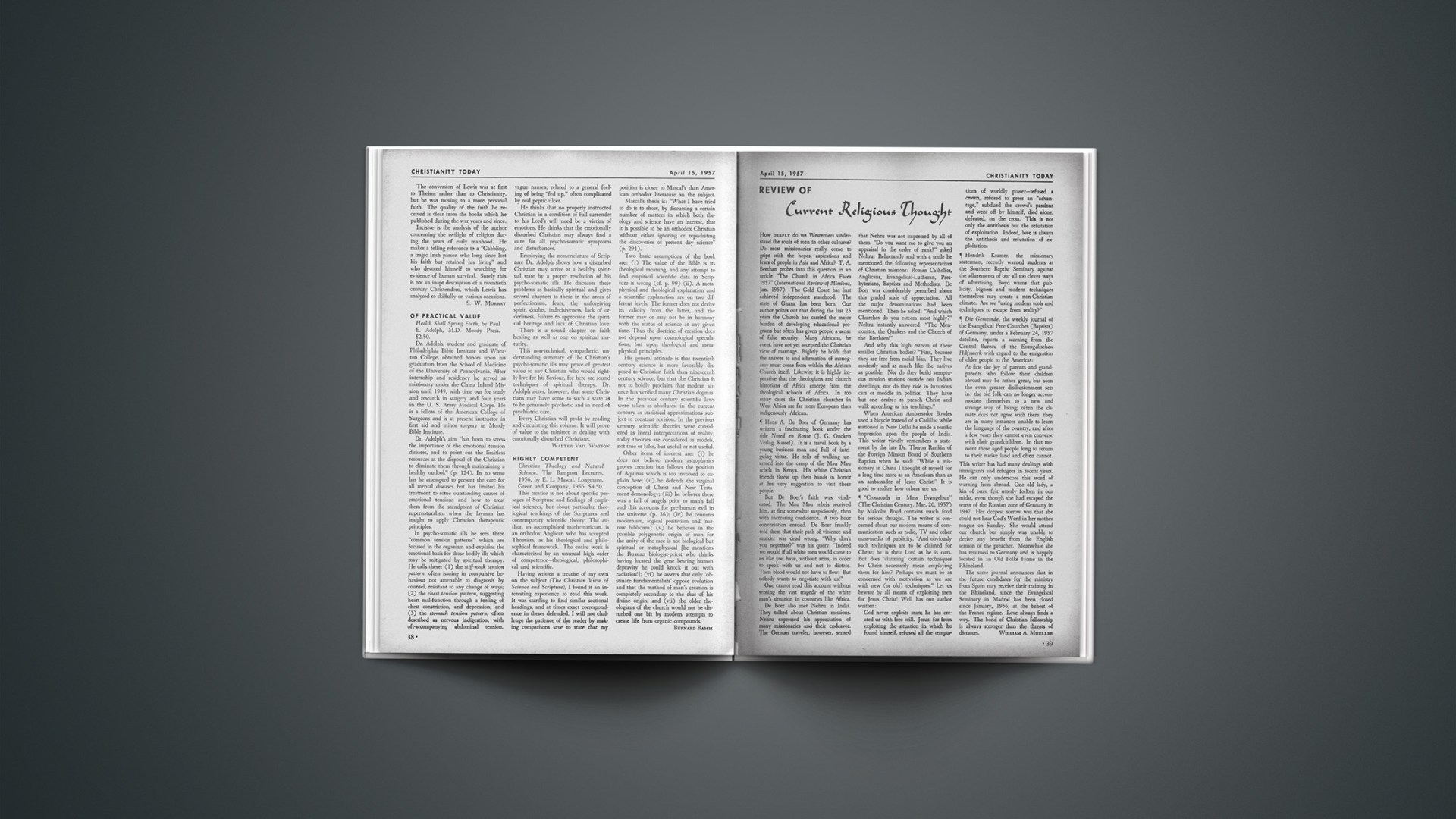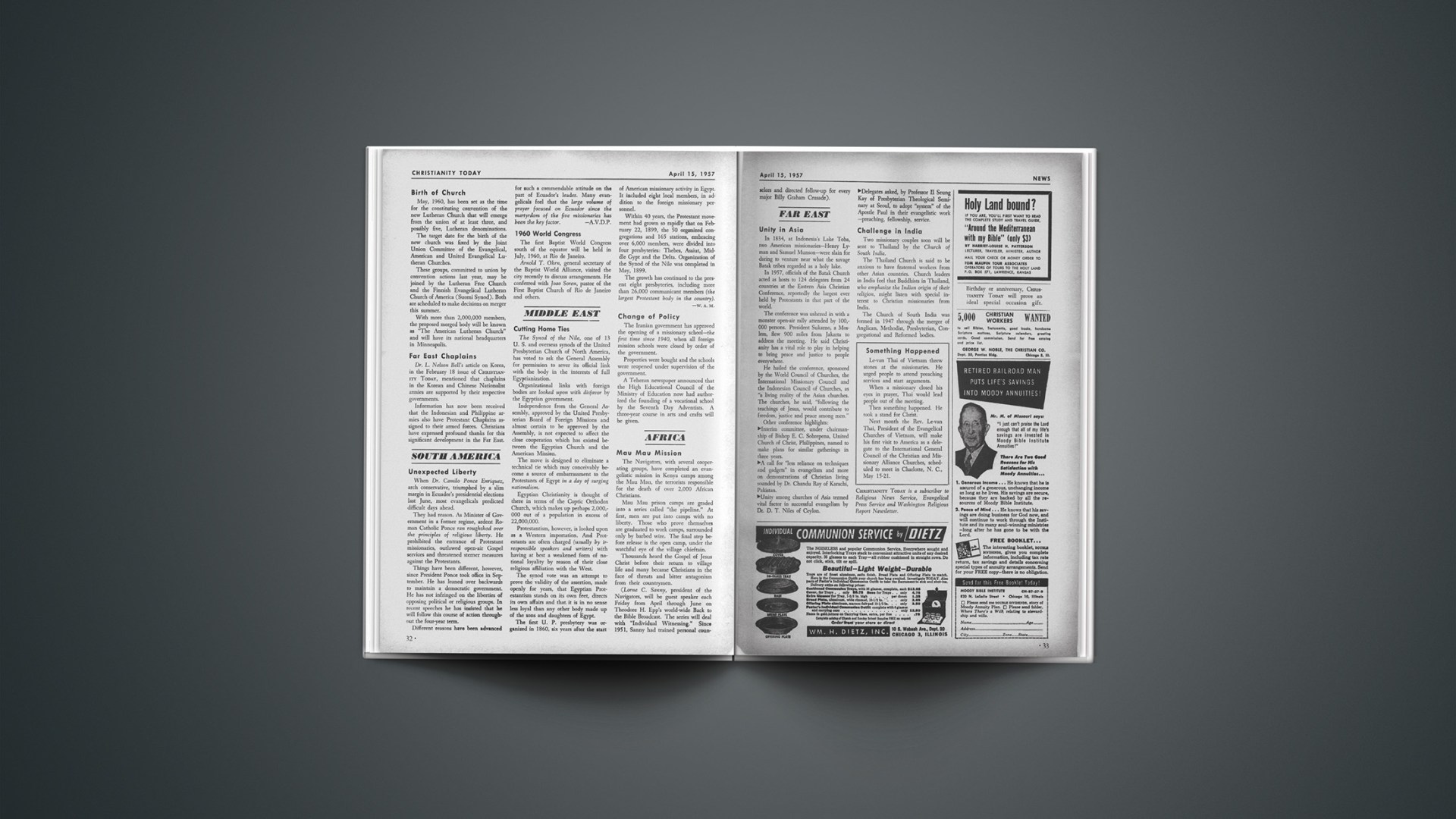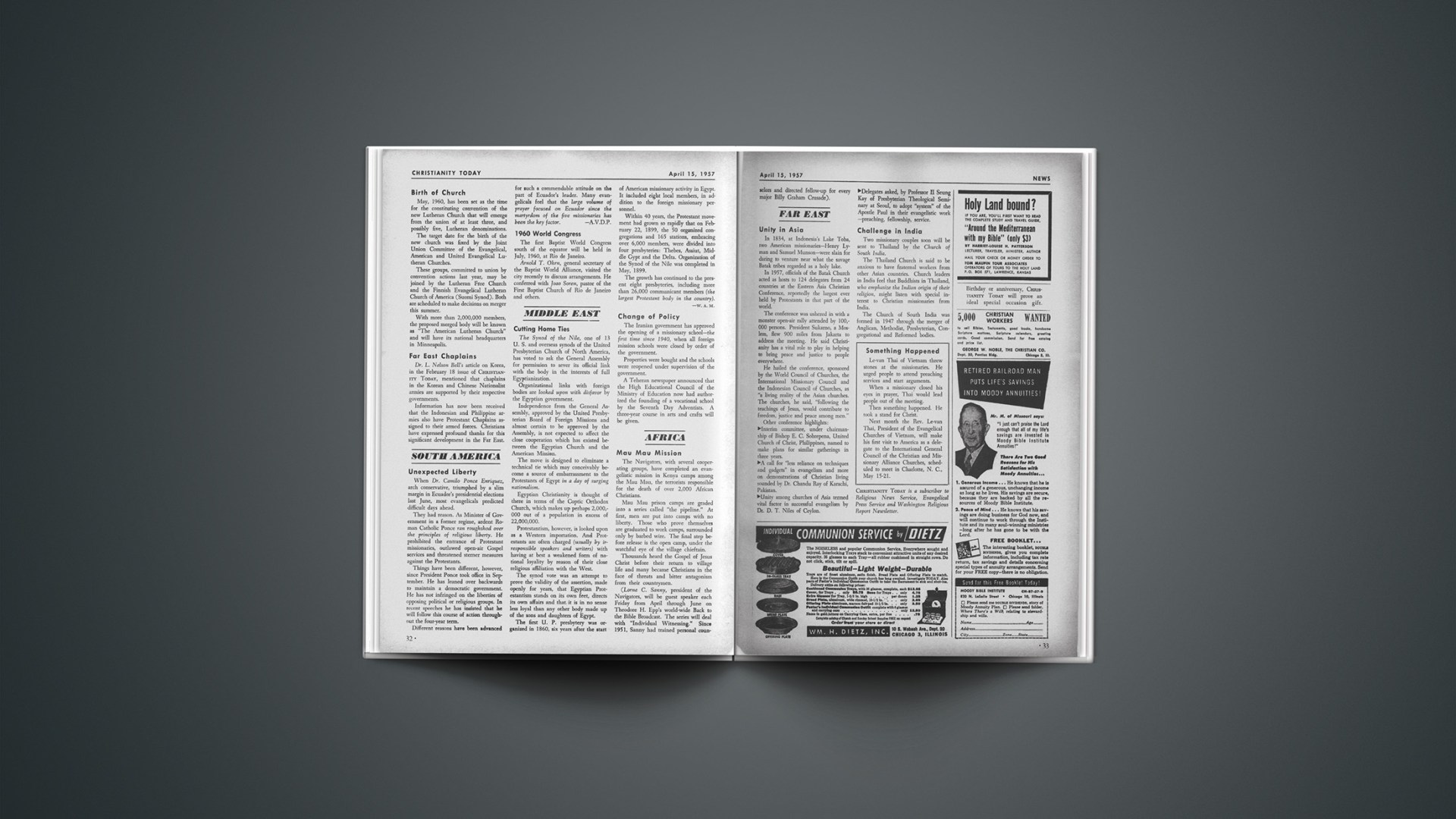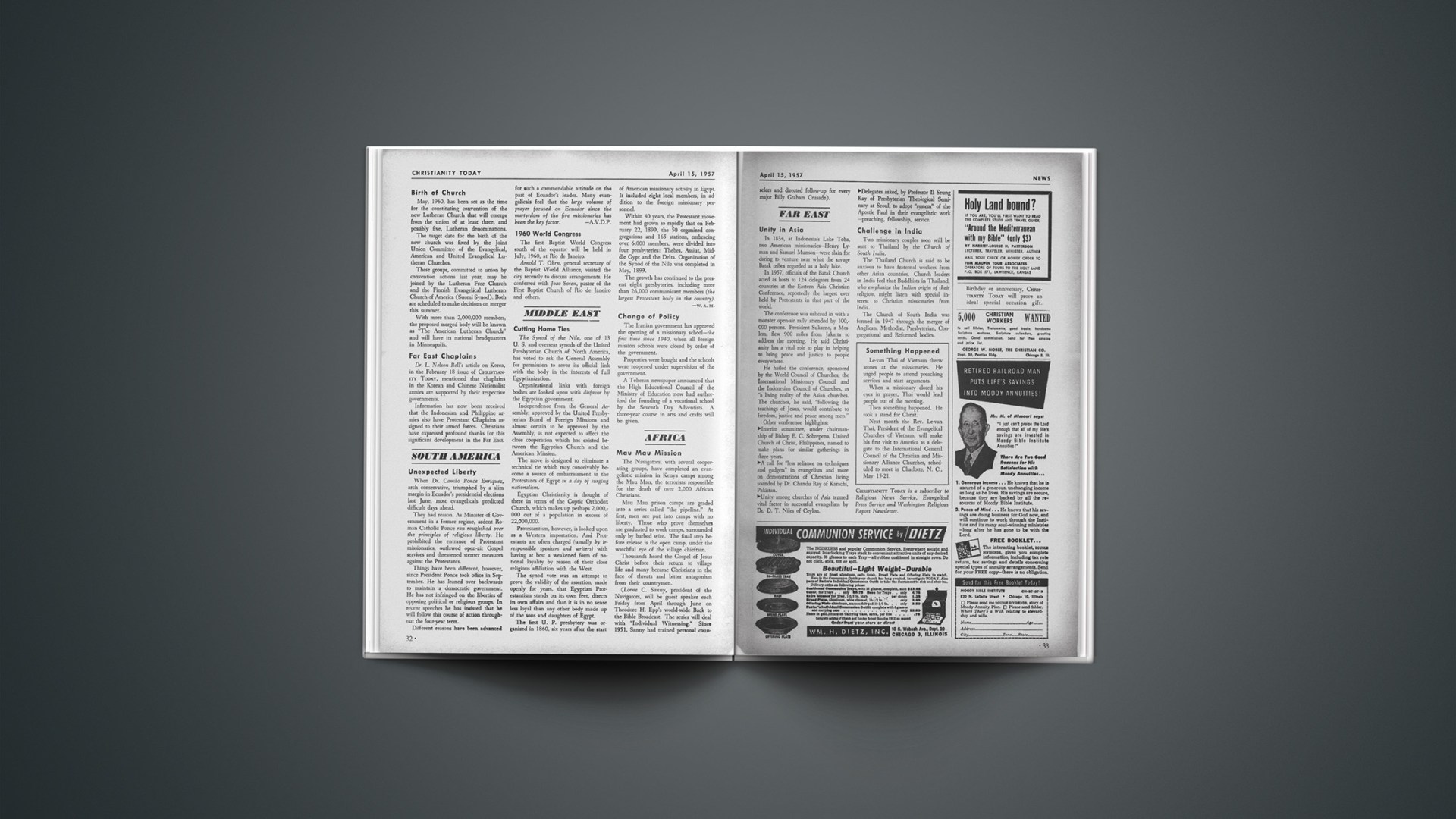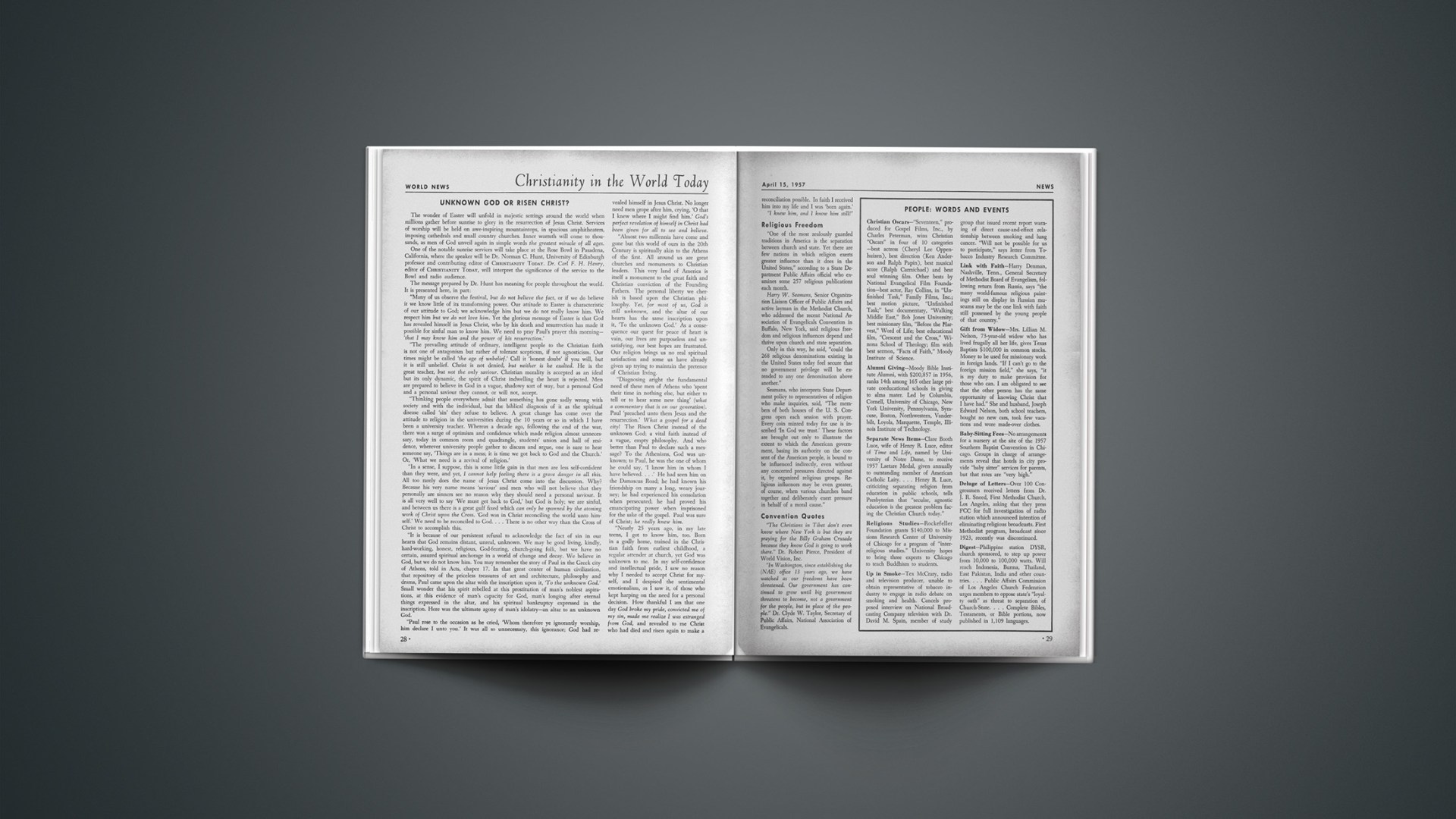As a Protestant layman I have come to the firm belief A that ecumenicity of spirit and purpose is more to be desired than organic union of our American churches. I assume that Protestant pastors and laymen are equally concerned about organizational changes that occur as church mergers take place.
If our ecumenical movement does not lead us in this direction of spiritual ecumenicity, I think Protestantism will lose much of its richest heritage. The over-all aim of Protestants, it seems to me, is to unite on the very highest levels, ideologically, and to be able to present a unified voice on major social, economic and political issues facing our nation.
The Big And The Dictatorial
The trick is to accomplish this worthy goal without pushing the layman aside—to have all the advantages of the “one voice” idea without damaging the individual’s relationship to his God and to his church. The problem revolves, in part, around the task of becoming big without becoming dictatorial; of becoming part of a greater whole and still retaining effective, independent self-expression.
We were discussing this at home one evening. In our town the daily newspapers carry rather complete reports of the annual church meetings: elections of officers, fixing of budgets, reports of progress and outlines of goals ahead. My father, for more than 40 years a clergyman, noted that the bishop of the Catholic diocese had announced his appointments to the diocesan boards. This encompassed many parishes and symbolized in one act the authoritarian character of a “one voice” church. How different from the democratic actions of the various Protestant groups who had elected their officers and outlined their own plans in free discussion.
There probably is no great ground swell toward organic union. There may not be a popular demand at the grass roots for further mergers of our American denominations. But we all know that the forces of ecumenicity (of which we ourselves may proudly be a part) are at work. It is timely, therefore, to ask questions about the nature of the unity that may be contemplated. The man in the pew and the man in the pulpit have a stake in the decisions that are to be made.
The Dictates From On High
Who will run united Protestantism? Will it be democratically governed? What role will laymen play? How important and how effective will be the voices of individual churches? How rigid will be the dictates from on high? In short, will control be vested in the hands of only a few men?
Let me illustrate the importance of these questions in regard to a specific problem raised by organic merger of two denominations. About ten years ago my denomination (United Brethren in Christ) united with another (Evangelical) in a merger supported with equal enthusiasm, I would say, by clergy and laymen alike. It was a logical development. There were no great creedal differences, and historically the two churches had traveled parallel paths.
I know, as everyone close to such mergers knows, that compromises must often be made in the interests of unity. In this instance one of the things which underwent re-examination was the united denomination’s policies and programs for higher education. Two seminaries now operate instead of three. One college has been closed in an attempt at economy and efficiency. Although many factors were involved in the decision to close the one school (through merger with another), the important fact is that its board of trustees repeatedly voted to replace a building destroyed by fire and to continue operation of the school on an expanded basis while, at the same time, the general church board controlling the funds for the colleges insisted that it be closed. This insistence was made effective by the board’s cutting off denominational grants essential to the school’s survival.
It can be argued, and with some cogency, that this was merely a matter of judgment. With this I do not disagree. But the important point here is that the centralized body exercised the final judgment over the repeated protests of the local governing body.
Laymen are concerned about such things. It is obvious that because of their daily work, laymen cannot generally spend as much time with commissions, boards or committees on a national level or even on a state level, as they can with their local churches. The same is true of the average small parish pastor. It is my contention, then, that organic union and centralization of authority do indeed represent a genuine threat to Protestantism.
Drifting Toward Control
To me, it appears there is likely to be a drift toward high-level ecclesiastical control of church business and policy.
That this potential shift to increased concentration of power is present concerns those within and outside the church because of the very considerable effect that church thought and action have on the nation’s economic and political life—to say nothing of their effect on the development of the spiritual man.
Dr. Elton Trueblood sees this as an age of growing importance for the layman. But it is my observation that the lay movement and the ecclesiastically engineered church mergers are not nicely meshed so that the church will move “like a mighty army.”
Layman’s Point Of View
Looking at the problem from the layman’s point of view, it seems to me that it is basic in Protestantism that we retain every particle of democracy we can as we move toward a union of faith and action.
It should be emphasized, as I see it, that almost all Christendom is working toward the union of Christ’s Church in accordance with varying interpretations of the universally accepted belief that Christ is its Head. Therefore, discussion turns not upon the desirability of unity but, rather, on how it should be accomplished and of what it should consist.
Our councils of churches, at various levels, are finding common fields of action. This is greatly to be desired. It is perhaps a natural consequence that one after another our great Protestant bodies are exploring the idea of organic union and often achieving it. However, in church government, as in civil government, it is axiomatic that the larger the governing unit, the smaller the voice of the individual.
The net effect of larger denominations is to remove laymen still farther from the points where decisions are made, leaving the higher eschelon clergy in more powerful control of church policy, creed and government. This I oppose.
Would it be heretical to suggest that in a large measure the Church as Christ wanted it may already be established in the hearts and minds of Christian believers and that organic union is not an essential to its fulfillment?
It has been said (perhaps too often) that democracy and Christianity have much in common. They both stress initiative, provide freedom of expression, emphasize equality of opportunity and are based on the inherent value of the individual. I am not eager to say that the Christian faith can operate only in the political and economic framework of democracy. But I do say that the layman can best practice his religion in an atmosphere of freedom and that this is one of the great reasons America has achieved a place of world leadership, imperfect though this may be.
Thus I believe that the layman plays an important role in God’s plan. Possibly Christ would be distressed were he to see the multiplicity of methods, creeds and rituals used in worshipping him. But he might overlook the mere mechanics of man’s approach to him if he saw the pathway clear for each man to find his way to worship God. There are almost 250 Protestant denominations in the United States today. And yet, even with the vehicle of representative government provided by many of them, the layman has little voice in state, national or world church administration.
Without Organic Union?
If the end we seek in promoting ecumenicity is spiritual unity, can it not be achieved without organic union? Or, if there are forces promoting religious regimentation, can they achieve it more effectively by any means other than organic union?
Should the ecumenical movement result only in the building of church giants or one giant Protestant church, we might some day face the threat of a Protestant hierarchy having in it the seeds of regimentation and unyielding authoritarianism.
A Fellowship Of The Spirit
The ecumenical movement, in my opinion, will serve both God and man best if it develops as a fellowship of the spirit. A centralization of religious organization and thought is as dangerous to Protestantism as similar trends are to democracy in the realm of civil government.
It is not to be supposed that leaders of contemplated or effected church mergers are guilty of willful designs against a democratic Protestantism. I prefer to believe that all church mergers are motivated by the highest of Christian ethical standards, and perhaps they are, but there is the omnipresent danger of spiritual democracy being sacrificed on the altar of organizational bigness.
The long-range dangers are real enough, however, to be of genuine concern to clerics and laymen alike who are charged equally with the burden of carrying out the Christian mission. Anything less than this cooperative spirit is unworthy of the Protestant tradition and unworthy, too, of Christ who had to enlist imperfect men of his age to do his work.
An active Christian layman, Gilbert M. Savery has been news editor of the Lincoln Evening Journal in Nebraska for 13 years, and formerly edited its church page. He works at close range with the Nebraska Council of Churches, and is an active member of his home church in Lincoln, Southminster Evangelical United Brethren Church.

